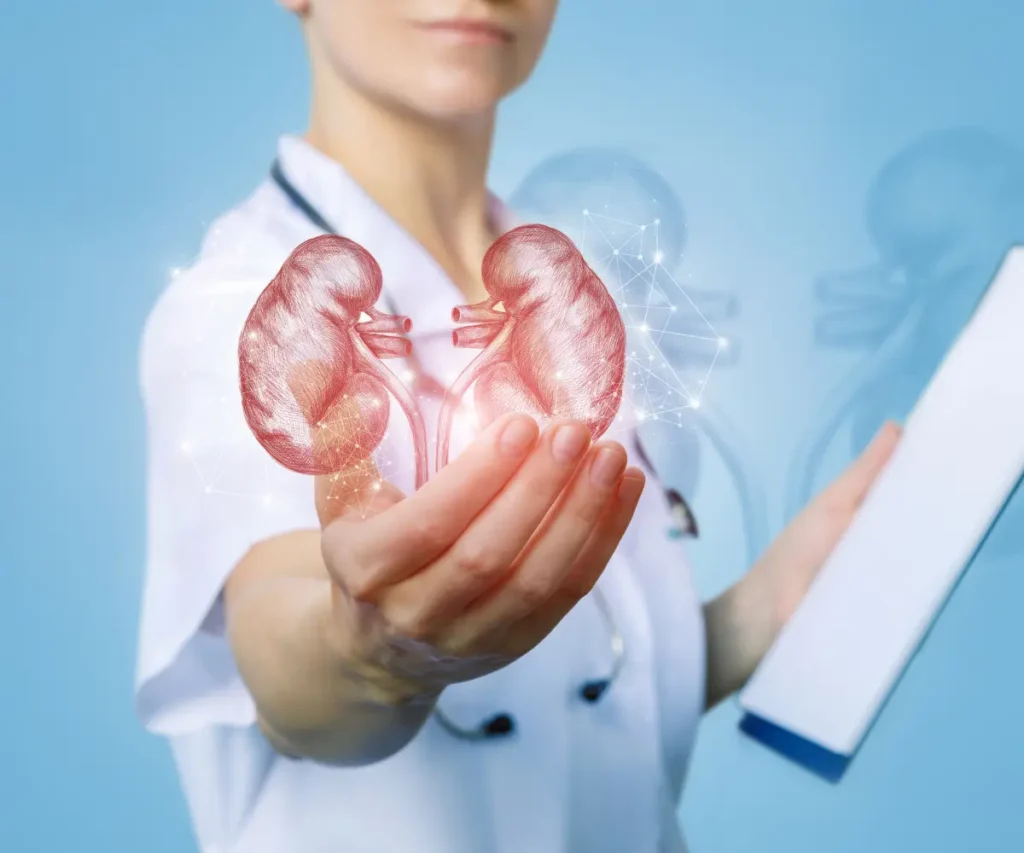Kidney Transplant Care
Kidney Transplant Care
Expert care to slow progression, improve quality of life, and support kidney health.

Comprehensive Kidney Transplant Care for a Healthier Future
Southern Oklahoma Kidney Center specializes in kidney transplant care, providing expert guidance before and after transplantation to ensure the best possible outcomes. Our team supports patients through every stage of the process, from evaluation and preparation to post-transplant monitoring and long-term kidney health management.
Comprehensive Kidney Transplant Care
- Pre-Transplant Evaluation
- Post-Transplant Monitoring
- Medication Management
- Infection Prevention & Immune Support
- Lifestyle & Nutrition Guidance
Kidney Transplant Care
Take Control of Your Kidney Health Today
Early detection and proper management can make a significant difference in your kidney health. Schedule an appointment with our specialists and get the expert care you deserve.
Services We Provide
- Management of acute kidney injury
- Chronic kidney disease management
- Diabetic kidney disease
- End-Stage Renal Disease (ESRD) Care & Dialysis Support
- Management of glomerular diseases
- Home Hemodialysis
- Home Peritoneal Hemodialysis
- Hypertension Diagnosis & Management
- Kidney Stone (Nephrolithiasis) Management
- Kidney Transplant Patient Care
Need Any Help?
580-223-8614
We’re Here to Help
What is Kidney Transplant Care?
Kidney transplants are one of the most effective treatments for those with end-stage kidney disease. Our Kidney Transplant Program is focused on the needs of recipients and donors. Our kidney transplant experts assist our patients every step of the way — from evaluation to post-surgery care — holding ourselves to the highest standards of safety and success in our care.
Kidney Transplantation 101
Kidney transplant is a surgical procedure in which a healthy kidney (from a living kidney donor or a deceased donor) is placed into a person with kidney failure. Even better, it is a treatment alternative that improves life expectancy over and above treatment with dialyzers. Kidney transplant surgery aims to restore renal function, enabling patients to lead longer and healthier lives.
Who Can Be a Kidney Donor?
A kidney donor can be someone who is alive or it can be from a deceased individual. Living kidney transplant surgeries provide the best outcomes since these kidneys have been known to work longer. Many of these use deceased donors, however, due to organ donor shortage. This process includes extensive medical screenings and psychological assessments to ensure that the donor is healthy and a good match for the recipient.
The Kidney Transplant Process
Career Medical Evaluation – Both potential donors and recipients must go through rigorous screenings to ensure their compatibility, including blood type compatibility testing, as well as overall health evaluations.
National Kidney Registry — The transplant team evaluates the best match of available donors, activating paired kidney donation if no direct match is found.
Transplant Surgery – The donor is taken to the operating room for a healthy kidney to be removed, and the recipient is brought to the transplant surgery.
Post-Surgery Care – From medical care for recipients and donors to ensure that they are recovering well and that their new kidneys are functioning optimally.
Risks and Considerations
Kidney transplants can be highly effective, but they are not without risks. Recovery from kidney donation surgery is different for everyone, but donors usually get back to normal activities within weeks. But there can be a slight risk of post donation hypertension. The kidney transplant care team deals with psychological factors, such as the emotional impact of the donation, potential guilt or worries about the recipient’s health.
For recipients, the body can reject the new kidney but medication helps prevent that from happening. Long-term success requires regular monitoring of your analytics.
Why Trust Us for Kidney Transplant Care?

Expert Nephrologists
Our team of experienced kidney specialists provides advanced and compassionate care tailored to your needs.

State-of-the-Art Facilities
Our advanced diagnostic tools and cutting-edge treatments ensure accurate monitoring and the best possible care.

Comprehensive Support & Education
From dietary guidance to lifestyle modifications, we equip you with the knowledge and resources to manage CKD effectively.

Personalized Treatment
Plans
We create customized care strategies based on your specific stage of CKD to help slow progression and improve quality of life.
Frequently Asked Questions
What are the risks of being a living kidney donor?
Kidney donation from a living donor is associated with a low risk of complications. But some donors may develop hypertension or see a small decrease in kidney function. There are also psychological risks involved — around stress or guilt, in case the transplant does not work. Our transplant team supports you throughout the entire process.
What if I change my mind and do not want to be a donor?
An prospective donor may withdraw at any point. This is a voluntary decision, made in confidence and with the full support of our kidney transplant specialists team.
How long will I stay in the hospital after donation?
Living kidney donors are generally hospitalized for 3-4 days; however, some may be discharged earlier depending on recovery.
How long until I can go back to work after donation?
Although recovery times may differ, the majority of living kidney donors are able to return to work within four weeks after the operation.
Will I be able to get pregnant after kidney donation?
True, kidney donation does not affect fertility. Most donors are able to have healthy pregnancies following donation.
